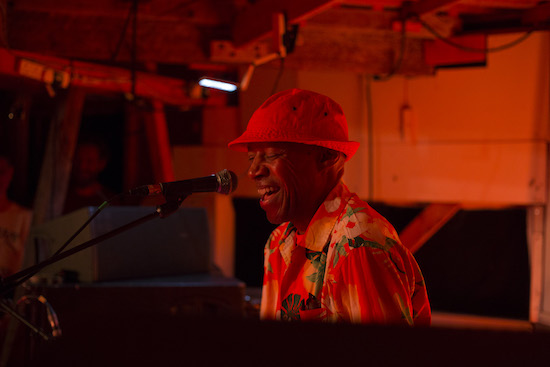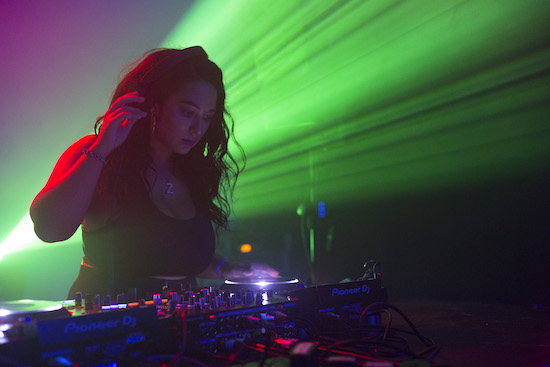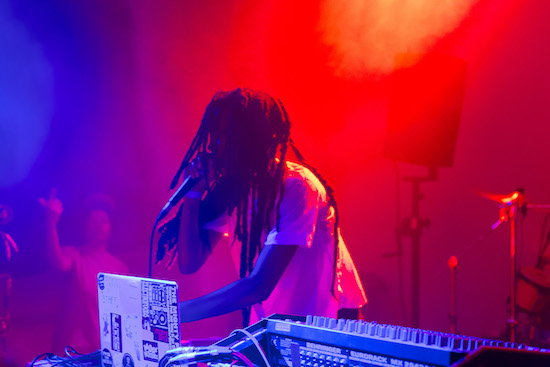Moor Mother photo and Yatta photo (on front page) by Wilf Speller/Wysing
In the countryside a few miles west of Cambridge, Wysing Arts Centre throws an annual one-day festival for a few hundred people. This year’s is curated by Moor Mother, Paul Purgas and Donna Lynas, who have invited a network of musicians, dancers and visual artists to focus their emotional, political, spiritual and mystical powers. It is unlike (and better than) most other festivals, a rich little haven in bucolic England.
Dance like everyone’s watching
Early on in the main room, Jamila Johnson-Small and Phoebe Collings-James lead a performance where five women (the others are Yasmine Akim, Onyeka Igwe and Katarzyna Perlak) dance in the centre of the main room at Wysing, in the dark, with disco lights and dry ice, and each holding an earthenware pod (made by Collings-James) the whole time, like a talisman or a bit of baggage. Over a tailor-made soundtrack that includes snippets of pop and soul and reggae, with snooker-ball noises and their own occasional yelps and calls, the five move fast and slow, together and apart. The audience stands around the edges of the hot, dark room; sometimes we feel like blokes watching girls dance in a club, sometimes it’s like watching neutrons move around in an atom, or wriggling kittens nestled together, playing and tumbling. The performance is full of stories, little chapters of comfort, strength, being sexy, being playful, solidarity, solitude, being watched; there’s a lot going on when you’re a woman and some friends, moving in the world.
There are infinite beautiful ways to be angry
Yatta stands in Wysing’s ramshackle wooden Amphis building, up on a hill, with their loops and samples and drones, creating a world with their jazz-spiritual vocals and their giddy-gravitas poetic interjections, working to be completely real with us. It’s spooky and powerful and gorgeous. They laugh, sometimes, and it’s a lovely angry laugh, a ‘what the fuck is this shit?’ laugh, a ‘ha ha oh god’ the-personal-is-political laugh, as the music shifts from gravelly rage to sweet soaring whoops. Their mum is here too, at the front, smiling and bursting with pride, which makes the whole thing even more powerful and gorgeous. Yatta acknowledges the audience in their improvations, their dynamics, their generous playing.
Harrga is angry too, yelling in the dark on the main stage; AGF Poemproducer is angry, as she announces ‘I’m giving you some more evil beats now”; Moor Mother is angry, perhaps the most beautifully brilliantly angry. One thing this festival does is show you that angry is frequently a very sane reaction, and there are a million brilliant things you can do with it when you aim it outwards, share it, use it, own it, channel it. Because (like Rose Windross always told you) it’s all about expression.
A Laraaji gig is good for the soul
At dusk, we’re packed in like sardines for Laraaji’s set in the Amphis building. It feels good: soft elation flows out of him and his music, and we are all gentle, close, comfortable sardines. We soak up the Laraaji-ness and shuffle about to make room for incomers, like we’re in a hotel sauna or a very small church.

Laraaji photo by Wilf Speller/Wysing
Diversity is relaxing
A lot of us in the UK don’t realise the damage it’s doing to us, living in a cultural space dominated by mediocre white boys and their wives-to-be, and then you spend a day in a cultural, living, breathing, exciting space that isn’t dominated by anyone, where there are thin women, fat women, black, white, brown women, trans women, enby beauties, and you feel deep-down relaxed and safe and alive. It’s like a car alarm has been going off for years and you got used to it but now it’s stopped and you can hear the birds singing.
It’s good to talk (and listen)
Synaptic Island host Listening Sessions at Corsica Studios in south London; today they’re hosting a couple of sessions at Wysing. (At Corsica the sessions are women and non-binary only; today men are allowed but they’re asked to consider how much time and space they take up, which is a request that should be made more often.) You bring a song you want everyone to hear, and once the 30 or so people sitting cross legged in the dark room have listened to it, we discuss it or share our thoughts and reactions. It is neither too earnest or too intimidating; it is fun and interesting and satisfying. The group’s comments included: on Zuli’s ‘Trigger Finger’ – “This is a cut-up rave flashback”; Alice Coltrane’s ‘Spiritual Eternal’ – “If I was walking down the street listening to this on my headphones, I’d just think I was the bee’s knees”; Peaches’ ‘I U She’ – “You can really trust Peaches to be your dom.”

DJ Haram photo by Wilf Speller/Wysing
What you once loved you will always love
The first music we hear at Wysing this year is Anita Baker, or rather a sliver of Anita Baker’s ‘Sweet Love’ used by Jamila Johnson-Small and Phoebe Collings-James as part of the evocative, extraordinary soundtrack to their dance piece – which also includes slices and sprinklings of Lee Perry, Sade and Marvin Gaye. In the listening room, we give full attention to Zuli’s ‘Trigger Finger’ and then hear it described as “a memory of raving”, which is perfect because its amen-break tumbles and techno echoes took us right back to Morley’s After Dark club circa 1992. Later in the studio, Imran Perretta plays Dizzee Rascal and the crowd goes ka-pow. And then DJ Haram, smoking a fag and being fabulous behind the decks, uses chunks of Technotronic’s ‘Pump Up The Jam’ in her belting end-of-the-night set. New music, old music, blah, whatever, we love it when it’s good.
Moor Mother is amazing (we knew this already, but still)
In an amateur move, I miss the start of Moor Mother’s set because I’ve got so sweaty dancing to Imran Perretta’s DJ set that I have to go for a cooling stroll around the grounds. (Perimenopausal raving: it has its downsides.) When I get in to the main stage where she’s playing, she’s just stopped the music to have a word with some chatty punters: “You might think I’m boujie, people think I’m boujie, but did you come here to fucking talk?” Angry women make me feel ALIVE. Then she plays some of the amazing 700 Bliss EP, shouting out to DJ Haram (her collaborator on that project) who’s at the back of the room. It’s great, and then it’s all over. I am gutted. Although then she walks off stage to Barrington Levy’s ‘Black Roses’ and I feel a bit better, and as my mate points out: we’ll just have to go and see her again as soon as humanly possible.


